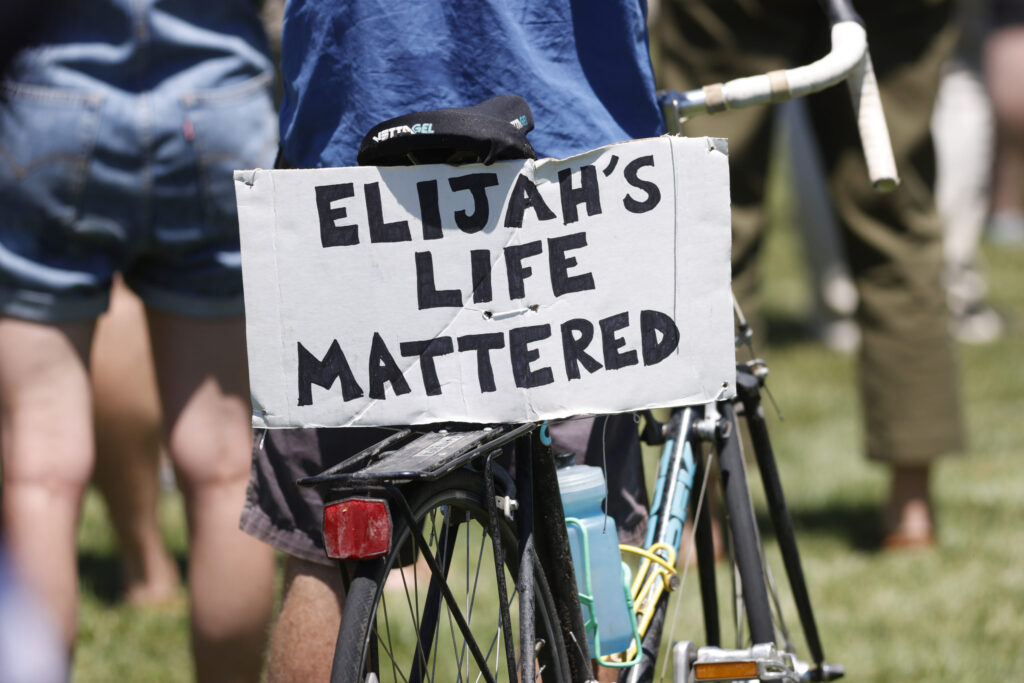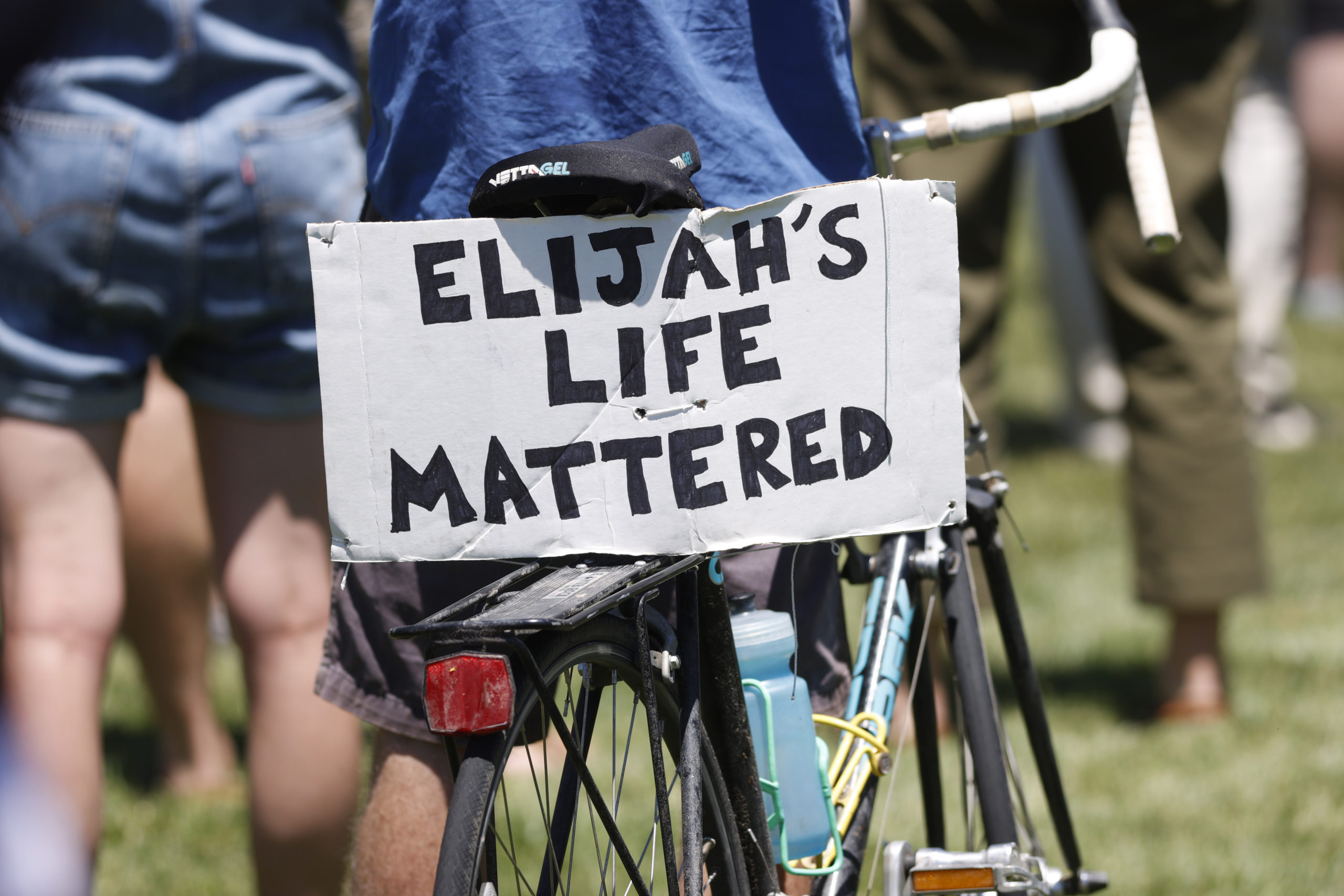BRIGHTON, Colo. — In the final argument in their case against two Aurora, Colorado, police officers on trial for the death of a Black unarmed 23-year-old, prosecutors boiled it down to one thing.
Their training.
State prosecutors Duane Lyons and Jason Slothouber told jurors that then-Aurora Police officers Randy Roedema and Jason Rosenblatt were properly trained and had pages of policies and procedures that, if followed, would have saved Elijah McClain’s life in August 2019.
“They were trained, they were told what to do,” Lyons said, in closing arguments. “It didn’t have to be this way … They were given instructions, they had opportunities and they failed to choose to de-escalate violence when they needed to.”

Step by step, prosecutors walked jurors through the 18 minutes between when McClain was stopped and when he was loaded up in an ambulance, where he eventually lost his pulse.
They say the officers ignored their training by not paying attention to his breathing. They allege they ignored their training when they didn’t heed him crying out he couldn’t breathe. They didn’t listen to his vital signs, nor did they communicate to paramedics that it was a medical emergency, prosecutors said.
Roedema and Rosenblatt each face manslaughter and second-degree assault charges.
“This is not just a tragedy, this is a crime,” Lyons said. “All of the evidence points to the inescapable conclusion that these defendants are guilty of the crimes charged.”
But two sets of defense attorneys, representing Roedema and Rosenblatt respectively, say the prosecution is piling on a set of circumstances that, while deeply unfortunate, does not amount to a crime.
“Just because there’s a tragedy does not mean there’s criminality,” said Don Cisson, one of Roedema’s attorneys. “When it comes to the question of criminality, the prosecution bears the burden beyond a reasonable doubt. That’s the highest standard in the law.”
Cisson also points out that everything looks worse when people “Monday morning quarterback” the police, but, “that’s not the way policing works.”
Harvey Steinberg, a lawyer representing Rosenblatt, portrayed his client, the least experienced officer facing charges, as just following orders and fearful that his superior officer said McClain reached for his gun.
“It all changed,” Steinberg said, noting that McClain also said, “I intend to take my power back.”
“Rosenblatt hears from a senior officer, ‘he’s going for your gun, dude,’” Steinberg said. “What’s he supposed to do? … What goes through his mind is we have to make sure no one gets hurt, and that includes me.”
Prosecutors told jurors to be “skeptical” of the claim that McClain reached for anyone’s gun because it wasn’t in his nature and because there is no video proof of it. Also, in an interview afterward in 2019, Rosenblatt told investigators that he didn’t recall anyone touching his weapon.
Even though Roedema and Rosenblatt are co-defendants, the jurors can determine their guilt or innocence separately of both of their charges, manslaughter and second-degree assault. This means, even though they are all sitting at the same table in this trial, lawyers have pointed fingers at the other one at times during the trial, including during closing arguments.
“Rosenblatt didn’t jerk his arm. It was Roedema. Rosenblatt didn’t have his knee in his back. It was Roedema,” Steinberg said, Rosenblatt’s attorney.
Roedema’s defense attorneys said there were, at one point, 10 officers on the scene, two sergeants, two EMTs and two medics and “not a single person had a single concern about what Randy Roedema did.”
In the prosecutor’s rebuttal, Slothouber said that shouldn’t have anything to do with the behavior of the officers that night. He, again, pointed out that the officers didn’t follow their own policies and procedures.
“Just because there is a sergeant on the scene doesn’t mean that you stopped following your training,” he said.
Both defense teams pointed to the autopsy findings — which laid the blame on everyone with hands on McClain that night — as reason to blame the paramedics for McClain’s death, not the officers.
Dr. Stephen Cina, the forensic pathologist who performed McClain’s original autopsy, said he couldn’t be medically certain what killed McClain, so he said he died of complications of ketamine after forcible restraint.
“Elijah McClain would not have died but for the ketamine,” Cisson, Roedema’s attorney, said.
Slothouber countered that the officers’ negligence — specifically ignoring McClain’s increasingly labored breathing as he aspirated his own vomit after a carotid hold — contributed to his death.
“Even if they don’t push that needle in themselves … they’re leading the paramedics to this idea,” he told the jury, referencing the ketamine injection. Officers talked about giving McClain ketamine before paramedics arrived on scene with the drug. “They’re encouraging it and saying, yeah, perfect, and then they’re holding him in this dangerous position … That is guilt just as much as that they’ve done it themselves.”
The jury deliberated Tuesday only for about 15 minutes before being dismissed at 5 p.m. They will return to deliberate Wednesday at 8:30 a.m.








